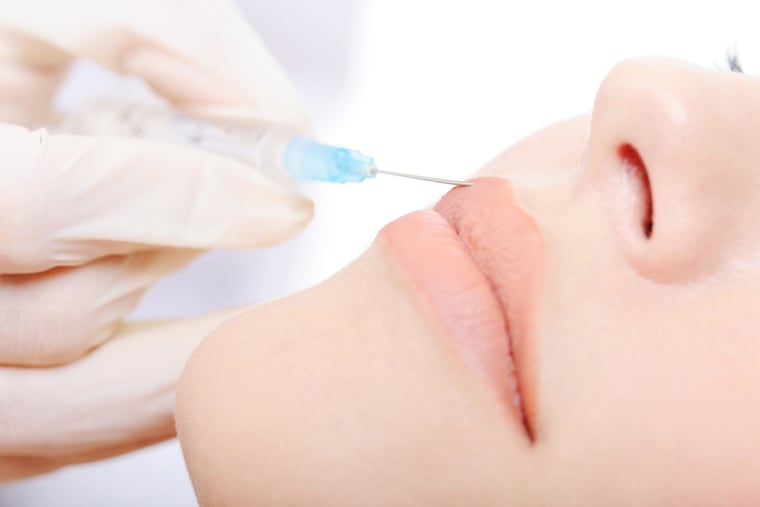Pandemic has created perfect storm for plastic surgery boom
Plastic surgeons across the globe are anecdotally reporting an unprecedented number of requests for procedures.

After logging many hours on Zoom, Sarah Hayes became distressed.
"I noticed my face was starting to look older: fine lines and droopy," said the senior program manager for a financial firm in New Hampshire. "I'm definitely bothered by my lines more on video than in real life."
So, she decided to get Botox.
Call it a Zoom boom. Or an opportune moment. Plastic surgeons across the globe are anecdotally reporting an unprecedented number of requests for procedures. "It is unknown if this is pent-up demand from the months of shutdown when patients were not able to get their procedures, or increased interest because of other potential factors," said Adam Ross, spokesman for the American Society of Plastic Surgeons, adding that the organization would not have estimates for the number of procedures done this year until spring 2021.
It has been the perfect storm, according to those in the field. Many workers are spending more time on Zoom, which isn’t the most flattering of mirrors. They’re also realizing they won’t have to return to an office anytime soon, which will make recovery, and keeping surgery private, easier. Those who choose facial surgery can cover postoperative swelling with a mask when in public. Add to that the backlog of patients whose procedures were postponed during shutdowns, and the cosmetic surgeon’s clinic or operating room has become a coveted place to be.
Jon Mendelsohn, medical director of Advanced Cosmetic Surgery & Laser Center in Cincinnati, said injectable procedures such as Botox and fillers were up 90% compared with the same period last year. He doubled his days in the operating room and extended his hours drastically. "During the virtual consultations, 9 out of 10 people commented about noticing these things over Zoom," Mendelsohn said.
Jason Champagne, a plastic surgeon in Beverly Hills, Calif., said many people focus on their chin, jawline and neck on Zoom, because the camera angles tend to accentuate those features. "We are not accustomed to seeing ourselves while in conversation with others, so people are paying attention to their facial movements and features while speaking," Champagne said.
But Zoom is only partly responsible for the spike in interest, and simple injectable procedures aren't the only ones in high demand. Other people who had considered cosmetic surgery in the past had postponed the idea because of the significant downtime required post-surgery - usually two to four weeks for procedures such as facelifts, for example. But now that they're working from home, they're reevaluating.
"There are people who thought they'd never have downtime, because they were going to the office every day," said Steven Levine, a New York-based plastic surgeon. Now that they're working from home, he added, they might feel okay getting back to their remote desks after just a few days off, because no one can see them.
Still other potential patients are taking advantage of the fact that there aren't any in-person weddings, bar or bat mitzvahs, or major vacations to work around, Levine said. Plus, if they are still employed, they aren't spending money on those vacations or many other pre-pandemic activities, and they may have extra cash to spend.
The slowed-down social scene is the reason that Iva Marra, star of the Australian reality show "Yummy Mummies," has scheduled four procedures with surgeon Daniel Lanzer, including liposuction and a neck lift. "Events haven't fully ramped up yet, not many people are going out, so if everyone is home, it's the perfect time to recover," Marra said.
If you're a prospective patient, you should ensure that your surgeon is following recommendations from the Centers for Disease Control and Prevention, Lanzer said, which include limiting in-office visits, conducting coronavirus screenings of staff and patients, and requiring everyone to wear face masks. "When performed safely, there is no extra risk of covid with cosmetic surgery," he said.
Another factor to consider is what you expect from the surgery.
Suzanne Trott, a board-certified plastic surgeon in Beverly Hills, said it's not about how you look on Zoom, but about how you feel that makes going forward with a cosmetic procedure worthwhile. "When you feel more confident, you will project a more positive image, and you will actually be more productive and successful with your work," she said.
But therapists are more hesitant to recommend cosmetic surgery as a quick fix. "The way in which you look does not have as much of an impact as one might think on one's life," said Michael Mazius, a behavioral psychologist in Mequon, Wis. "If you like the way you look after surgery and it gives you newfound confidence, it's unlikely the confidence will last if you haven't meaningfully altered the architecture of your mind."
Still, psychologists aren't surprised that people are turning to cosmetic surgery during the pandemic. Robin Hornstein, a psychologist in Philadelphia, said we're all feeling out of control at the moment, and a step like this puts people in control of something. Also, she said, it's important to remember that video meetings are a new situation for most of us.
"In this way, a Zoom-inspired plastic surgery may be based on a new reality, and I would caution the judgment it elicits about our looks," Hornstein said. "I, for one, am tired of looking at my own face all day - and I like myself."
You shouldn’t expect cosmetic surgery to make you happy, Hornstein said. It may, however, erase your frown lines.